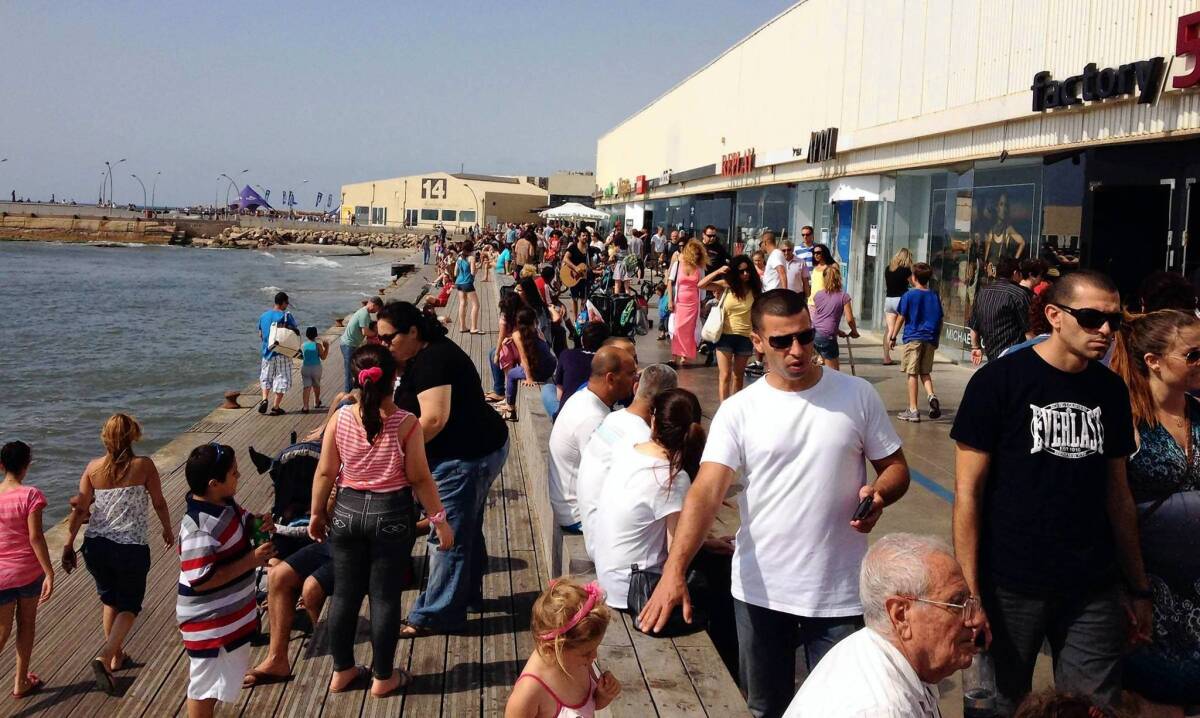Israel forms two lines over shopping on the Sabbath

- Share via
TEL AVIV — It’s a bright Saturday morning and shopkeepers at the trendy Tel Aviv Port shopping mall are bracing for the thousands of Israeli families about to descend upon the city’s busiest outdoor retail promenade.
But among the first visitors many Saturdays is a city inspector, who goes store to store issuing $200 citations to business owners for violating Tel Aviv’s ordinance against conducting commerce on the Jewish Sabbath.
Small-shop owners fire off cellphone text messages to warn one another that the inspector is making the rounds; then they chase out customers and shut their doors until he passes. Larger chains shrug off the ticket as a cost of business, far overshadowed by the profits they stand to make. A single pair of jeans at the Levi’s store costs more than the fine.
Hoping to cash in on Israelis’ growing affluence and lust for shopping, malls, retailers, restaurants and cinemas are throwing open their doors on Saturdays. But the trend butts up against longtime government restrictions and infuriates religious groups that want the day preserved as one of rest.
Though national law prohibits employing Jews on Saturday, enforcement has been sporadic, usually depending on the religious conviction of the sitting labor minister, according to public policy expert Guy Ben-Porat at Ben-Gurion University. Some cities also have laws against conducting business on Saturday, though Supreme Court rulings have upheld the right of certain types of commerce, including gas stations and cinemas.
It’s among the many secular-religious debates dividing Israelis. But while most such clashes end up at the government’s doorstep, the battle over shopping on the Sabbath is largely being dictated by the pocketbook, as retailers balance potential profits with a backlash, or boycotts, by the ultra-Orthodox.
On one side are secular and religiously tolerant consumers and business owners, who have reaped much of the benefit of Israel’s recent economic growth and view the country as a modern, Western-leaning society along the lines of the United States or much of Europe.
“Tel Aviv calls itself the ‘city that never sleeps,’” said Nirit Oren-Sternberg, owner of a designer home furnishings store at the Port. “So it’s outrageous that we get fined for being open on Saturday. Israelis love shopping. They work hard all week and this gives them an opportunity to shop on the weekend. If someone finds that offensive then they don’t have to come.”
The crowds that pack the Port and the 30 other malls now open Saturdays around the country suggest that many Israelis agree. On average, retailers who open on Saturday say the day accounts for 40% of their weekly sales. As many as half a million Israelis hit the malls every Saturday, according to industry estimates.
“Saturday can be a massive day,” said Ofer Shechter, chief executive of ProMall, which manages 35 malls, half of which are now open on Saturday. “The motivation is money.”
On the other side are leaders of Israel’s small but politically influential ultra-Orthodox community, known as haredim. They point to biblical commands about observing the Sabbath and ask: If Israel doesn’t honor them, who will?
“We have no right to the land of Israel without observing the Torah and its commandments,” said Shmuel Pappenheim, a spokesman for an umbrella group of haredi organizations. “If we don’t follow it and preserve the Sabbath, we might as well give up our claim and give it to the Arabs.”
Haredi leaders are seeking to slow the trend of shops opening on Saturdays by flexing their own economic muscle. The community has enjoyed success on some issues, pressuring private bus companies to provide separate seating for men and women and phone makers to offer so-called kosher cellphones that restrict Internet access and text messaging.
With an estimated $1.5 billion in annual buying power, the haredi community set up the Shabbat Committee in 2006 to monitor Sabbath observation and boycott businesses that ran afoul of its rules.
Their biggest target so far is businessman Dudi Weissman, who operates a chain of 24-hour markets called AM:PM. He also owns a supermarket chain, Shefa Shuk, that does about 40% of its business with the haredim.
Though AM:PM stores have always remained closed on Saturday in ultra-Orthodox Jewish neighborhoods, the Shabbat Committee demanded that Weissman close all of his stores on the Sabbath. When he refused, they called for a boycott of his supermarkets. Since then, some of the stores have shut down, though company officials have said the closures were unrelated to the boycott.
Weissman declined to comment, as did leaders of the Shabbat Committee. To date, most of his AM:PM stores remain open on Saturdays, leading even supporters of observing the Sabbath to question whether the effort succeeded.
“Boycotts are ineffective,” said Yakov Halperin, head of a mall-based optometry chain that closes all of its 130 offices on Saturday, even though it costs the company significant revenue. “They work for a limited time, but then they break down because the religious public is not united.”
Still, there is a chilling effect. Haifa-based Cinemall, a large shopping complex on the outskirts of the port city, is considering becoming the latest mall to open on Saturdays, perhaps this fall. But the owner is hesitating, in part out of personal religious beliefs, a mall manager said. Business rivals noted that he also owns a supermarket chain that could be vulnerable to a boycott.
Religious activists have succeeded in keeping most malls that are in city centers and near residential neighborhoods closed. Nearly all the shopping centers currently open on Saturday are in industrial zones or along the city edges. In religious cities, like Jerusalem, only a few restaurants, cinemas and gas stations dare to open.
But experts predict more shops will open on Saturdays as competition intensifies.
“If you look at the trends, secularization is winning big time in this case,” said Ben-Porat, who has studied the intersection of religion and business for years. “Just 20 years ago you could hardly find anything open in the country on Saturday.”
He said the trend was bolstered in the 1990s, when Israel shifted away from socialism and experienced an influx of more than 1 million Russian immigrants, many of whom were secular or non-Jewish.
“Ultimately this is an issue that is moving away from the political realm,” Ben-Porat said. “It’s really being decided by profits, not ideology and not public policy.”
Batsheva Sobelman of The Times’ Jerusalem bureau contributed to this report.
More to Read
Sign up for Essential California
The most important California stories and recommendations in your inbox every morning.
You may occasionally receive promotional content from the Los Angeles Times.










